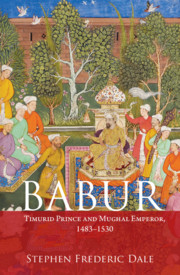Book contents
- Frontmatter
- Dedication
- Contents
- List of Illustrations and Maps
- Preface
- Abbreviations
- Introduction
- 1 Qazaq: A Timurid Vagabond
- 2 Padshahliq, Governance, in Kabul
- 3 Mulkgirliq: The Act of Kingdom-Seizing
- 4 Padshahliq, Governance, in Hindustan
- 5 Gurbatliq: An Indian Exile
- Conclusion
- Glossary
- Bibliography
- Index
- Plate section
5 - Gurbatliq: An Indian Exile
Published online by Cambridge University Press: 13 September 2018
- Frontmatter
- Dedication
- Contents
- List of Illustrations and Maps
- Preface
- Abbreviations
- Introduction
- 1 Qazaq: A Timurid Vagabond
- 2 Padshahliq, Governance, in Kabul
- 3 Mulkgirliq: The Act of Kingdom-Seizing
- 4 Padshahliq, Governance, in Hindustan
- 5 Gurbatliq: An Indian Exile
- Conclusion
- Glossary
- Bibliography
- Index
- Plate section
Summary
In December 1528, not only did Babur celebrate the foundation of the Timurid Empire of Hindustan, on 27th of the month, he also completed a second collection of his verse, now known as the Rampur Diwan, named after the Indian town where the manuscript was discovered. The collection includes a copy of his versified translation of Khwajah ‘Ubaidullah Ahrar's text, a masnavi, a ghazal, several ruba‘iyat and other verse fragments. Babur's ruba‘iyat contains psychologically revealing lines about his state of mind during the preceding two and half years. They express and magnify the degree of unease or actual depression he sometimes felt during this period of intense activity, and which he hints at in the few long verses he includes in the Vaqayi’ for 1528.
Having desired Hindustan, as he insists, since taking Kabul in 1504, he increasingly reveals himself to be deeply conflicted by his exile or ghurbat, from what he had come to regard as a richer life in a poorer but better place – the Afghan capital. He had already expressed a degree of remorse in his verse reply to Khwajah Kalan's parting poetic shot, which his friend had left on the wall of his house in Agra in 1526. The sense of loss he hints at in that poem and the depression he alludes to after translating and versifying Khwajah Ahrar's verse, Babur expresses poignantly in several of the poems of the Rampur Diwan. He also reiterates his feelings in a letter he sends to Khwajah Kalan on 10 February 1529. Nonetheless, he, quite literally, ‘soldiered on’ during the next 2 years as he fought to replenish his depleted treasury and expand the perimeter of the Timurid state. All the while he struggled to retain control over his imperfectly subjugated home territories: the Punjab, and the Delhi-Agra Duab and then, there were the illnesses.
A Darkening Mood
In the first Turki ruba‘i listed in the Rampur collection, written apparently just after Babur had celebrated becoming a ghazi, and not a shahid, at the Battle of Kanwah, he openly reveals the emotional regret he felt after finally obtaining what he earlier claimed was his long sought goal – Hindustan.
- Type
- Chapter
- Information
- BaburTimurid Prince and Mughal Emperor, 1483-1530, pp. 175 - 208Publisher: Cambridge University PressPrint publication year: 2018



